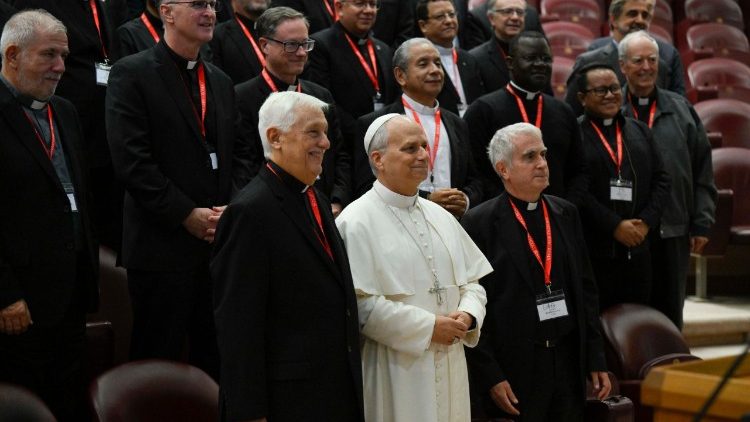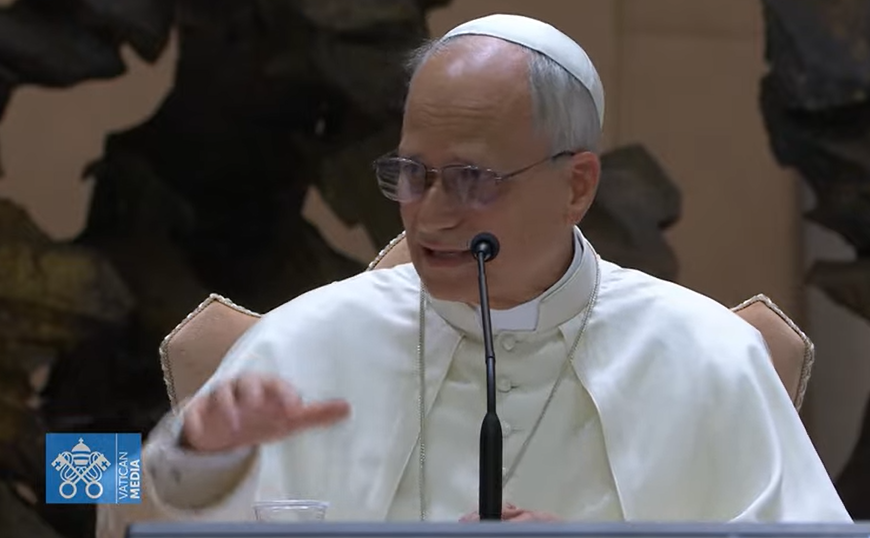“And he opened his mouth unto blasphemies against God, to blaspheme his name” (Apoc 13:6)…
Francis blasphemes again: “This Holy Spirit is a Disaster”!

When he’s not being his dictatorial self, Francis is a jolly old fellow. He loves to joke around with others and enjoys moments of levity — especially at the expense of the Most Holy Trinity. We need but recall a few recent examples:
Today “His Holiness” decided it was time for a new one and called the Holy Ghost a “disaster”. Too funny, eh?
Speaking to participants in the International Convention promoted by the Congregation for the Institutes of Consecrated Life and the Societies of Apostolic Life, Francis tossed aside his prepared remarks because, so he said, he wanted “to say things suited to this moment.” Among the things “suited to this moment” was the following “witticism”:
Then, there is something else: this Holy Spirit is a disaster because He never tires of being creative! Now, with the new forms of consecrated life, He is truly creative, with the charisms… It is interesting: He is the Author of diversity but at the same time the Creator of unity. This is the Holy Spirit. And with this diversity of charisms and many things, He makes the unity of the Body of Christ, and also the unity of consecrated life. And this too is a challenge.
(Antipope Francis, in Jim Fair, “Pope Francis: Consecrated Need Authentic Guide”, Zenit, May 4, 2018; underlining added.)
Jorge Bergoglio made his off-the-cuff remarks in Italian, and the Vatican web site has the original wording as follows:
Poi, c’è un’altra cosa: che questo Spirito Santo è una calamità, perché non si stanca mai di essere creativo! Adesso, con le nuove forme di vita consacrata, davvero è creativo, con i carismi… E’ interessante: è l’Autore della diversità, ma allo stesso tempo il Creatore dell’unità. Questo è lo Spirito Santo. E con questa diversità di carismi e tante cose, Lui fa l’unità del Corpo di Cristo, e anche l’unità della vita consacrata. E anche questa è una sfida.
(Antipope Francis, Address to Participants in the International Convention promoted by the Congregation for the Institutes of Consecrated Life and the Societies of Apostolic Life, Vatican.va, May 4, 2018; underlining added.)
The Italian word he used to refer to the Third Person of the Most Holy Trinity is word calamità, which corresponds to the English “calamity” or “disaster”. Hyperbole or not, joking or not, this is a blasphemy! Both the Zenit translation and the Vatican original, by the way, note that there was “laughter” when he thus insulted the Holy Ghost. This must be the “joy” he keeps droning on about!
Aside from the obvious direct insult to God, there is another matter to consider here. The Second Commandment states: “Thou shalt not take the name of the Lord thy God in vain: for the Lord will not hold him guiltless that shall take the name of the Lord his God in vain” (Ex 20:7). Then again, since at least Amoris Laetitia, the Ten Commandments have been reduced by Bergoglio to the status of Ten Ideals or Ten Suggestions, to be relativized in accordance with the concrete circumstances of the situation and every sinner’s very own personal “limits”. In other words, the “god of surprises” has revealed to us now that the Ten Commandments really came with a footnote!
Francis had better be very careful, because he is placing himself in a position from which it is unlikely he will ever escape: “Therefore I say to you: Every sin and blasphemy shall be forgiven men, but the blasphemy of the Spirit shall not be forgiven. And whosoever shall speak a word against the Son of man, it shall be forgiven him: but he that shall speak against the Holy Ghost, it shall not be forgiven him, neither in this world, nor in the world to come” (Mt 12:31-32).
The Dominican moral theologians Fr. John McHugh and Fr. Charles Callan define blasphemy against the Holy Ghost as “contumely against God spoken out of sheer malice” (n. 898). They explain as follows:
899. To the Holy Ghost are appropriated the supernatural gifts of God that prevent or remove sin; and, as these can be reduced to six, there are also six sins against the Holy Ghost (i.e., six kinds of contemptuous disregard of spiritual life). The expression of this inner contempt is a blasphemy.
(a) Man is kept from sin by the hope mingled with fear which the thought of God, as both merciful and just, excites in him. Hence, despair and presumption which remove these divine preventives of sin are blasphemies against the Holy Ghost.
(b) Man is kept from sin, next, by the light God gives him to know the truth and by the grace He diffuses that all may perform good. Hence, resistance to the known truth and displeasure at the progress of God’s kingdom are also sins against the Spirit of truth and holiness.
(c) Man is kept from sin by the shamefulness of sin itself and the nothingness of the passing satisfaction it affords; for the former inclines him to be ashamed of sin committed, or to repent, while the latter tends to make him tire of sin and give it up. Hence, the resolve not to grieve over sin and obstinate adherence to such a resolve are also sins against the Holy Ghost.
900. There is no sin which, if repented of, cannot be forgiven in this life. How then does our Lord say that the blasphemy against the Holy Spirit shall not be forgiven, neither in this world nor in the world to come (Matt., xii. 31)?
(a) The sins against the Holy Ghost are unpardonable according to their nature, just as some diseases are incurable according to their nature, because not only do they set up an evil condition, but they also remove or resist those things that could lead to betterment. Thus, if one despairs, or presumes, or resists truth or good, or determines not to abandon error or evil, one shuts out the remedy of repentance, which is necessary for pardon; whereas, if one sins through passion or ignorance, faith and hope remain and help one to repentance.
(b) The sins against the Holy Ghost are not unpardonable, if we consider the omnipotence of God. Just as God can cure miraculously a disease that is humanly incurable, so can He pardon a sin which, according to its nature, is unpardonable; for He is able to bring hope and repentance to those who were in despair, for example. Hence, we repeat, there is no sin which, if repented of, cannot be forgiven in this life.
901. Does one arrive at the state of malicious sin or blasphemy suddenly or gradually? (a) Malice in sin (i.e., the willing choice of evil by one who is not weakened by ignorance or passion) is sometimes due to a disorder in the will itself which has a strong inclination towards wrong, as when long-continued habit has made sin attractive. It is clear that in such cases one does not arrive at blasphemy suddenly, Example: Titus blasphemes with readiness and without remorse. This argues that he is an adept and not a beginner, for readiness and strong attachment are signs of practice. (b) Malice in sin is sometimes due to the fact that the will has lost certain protections against sin, and hence chooses sin readily and gladly, as happens when a sin against the Holy Ghost has been committed. Generally, the contempt of God’s gifts contained in sins against the Holy Ghost does not come suddenly, but follows as the climax of a progressive deterioration (Prov., xviii. 3); but, since man is free and sin very alluring, it is not impossible that one should suddenly become a blasphemer, especially if one had not been careful before in other matters. It is next to impossible, however, that a religious-minded man should all at once become a blasphemer or malicious sinner.
(Rev. John A. McHugh & Rev. Charles J. Callan, Moral Theology, vol. 1 [New York, NY: Joseph F. Wagner, 1958], nn. 899-901; available online here.)
The ease with which Francis cracks jokes about God Himself is extremely disturbing and reveals what a sick individual and dangerous wolf is hiding inside those shepherd’s clothes: “But the things which proceed out of the mouth, come forth from the heart, and those things defile a man. For from the heart come forth evil thoughts, murders, adulteries, fornications, thefts, false testimonies, blasphemies. These are the things that defile a man…” (Mt 15:18-20).
Everybody can draw the obvious conclusion.
As far as disasters go, if Francis ever wants to truly encounter one, we suggest he take a good look in the mirror.
Image source: shutterstock.com
License: paid





No Comments
Be the first to start a conversation